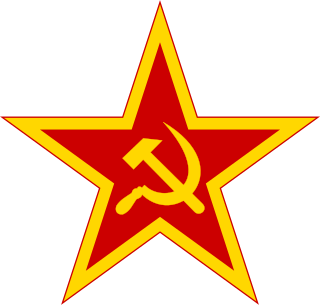
The Russian Airborne Troops or VDV is a military branch of the Armed Forces of the Russian Federation. First formed before World War II, the force undertook two significant airborne operations and a number of smaller jumps during the war and for many years after 1945 was the largest airborne force in the world. The force was split after the dissolution of the Soviet Union, losing divisions to Belarus and Ukraine, and has been reduced in size.
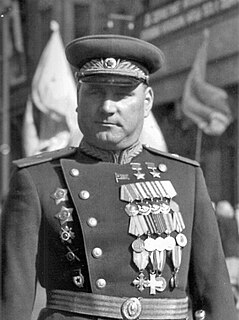
Ivan Ignatyevich Yakubovsky was a Marshal of the Soviet Union, twice made a Hero of the Soviet Union and serving as commander-in-chief of the Warsaw Pact from 1967 to 1976.

The military ranks of the Soviet Union were those introduced after the October Revolution of 1917. At that time the Imperial Russian Table of Ranks was abolished, as were the privileges of the pre-Soviet Russian nobility.

The January Events took place in Lithuania between 11 and 13 January 1991 in the aftermath of the Act of the Re-Establishment of the State of Lithuania. As a result of Soviet military actions, 14 civilians were killed and 702 were injured. The events were centered in its capital, Vilnius, along with related actions in its suburbs and in the cities of Alytus, Šiauliai, Varėna, and Kaunas.

Pavel Sergeyevich Grachev, sometimes transliterated as Grachov, was a Russian Army General and the Defence Minister of the Russian Federation from 1992 to 1996; in 1988 he was awarded Hero of the Soviet Union gold star. As Defence Minister, Grachev gained notoriety because of his military incompetence displayed during the First Chechen War and the persistent allegations of involvement in enormous corruption scandals.
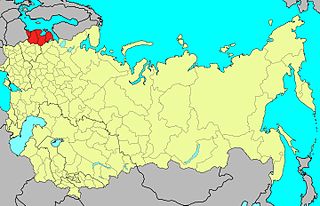
The Baltic Military District was a military district of the Soviet armed forces in the occupied Baltic states, formed briefly before the German invasion during the World War II. After end of the war the Kaliningrad Oblast was added to the District's control in 1946, and the territory of Estonia was transferred back to the Baltic Military District from the Leningrad Military District in 1956. The Baltic Military District was disbanded after the fall of the Soviet Union in 1991 and reorganised into the North Western Group of Forces, which ended its existence after withdrawal of all Russian troops from Estonia, Latvia and Lithuania on 1 September 1994.

The 76th Guards Air Assault Division is a division of the Russian Airborne Troops based in Pskov. The division traces its lineage back to the 76th Guards Rifle Division, formed in March 1943 from the 157th Rifle Division for that division's actions during the Battle of Stalingrad. The division fought in the Battle of Kursk, the Battle of the Dnieper, Operation Bagration, the East Pomeranian Offensive, and the Berlin Offensive. Postwar, it was converted into an airborne division. The division moved to Pskov, its current base, in 1949. The division was involved in Black January and the January Events in Lithuania. After the Dissolution of the Soviet Union, the division became part of the Russian Airborne Troops. The division fought in the First Chechen War, Second Chechen War and the Russo-Georgian War. The division became an air assault division in 2006. It was involved in the Annexation of Crimea and the War in Donbass.
Vyacheslav Nikolaevich Borisov is a Russian major-general of the 2008 South Ossetian War.

The 242nd Training Centre of the Airborne Forces is a brigade-sized training formation of the Russian Airborne Troops.
Dadash Rzayev Garib oglu was Minister of Defense of Azerbaijan from February to June 1993 and is currently the Chairman of Confederation of Azerbaijani Officers in Reserve. His active service in the army lasted for 40 years, 37 of which were in the Airborne Troops.

Serhi Gnatovich Rudenko was a Soviet Marshal of the aviation.

The 7th Guards Mountain Air Assault Division is an elite guards division of the Russian Airborne Troops.

Vladislav Achalov was a Soviet general who at one time commanded the Soviet Airborne Forces.
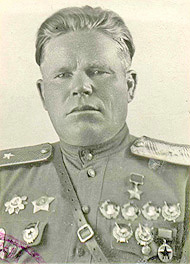
Ivan Nikitich Konev was a Soviet major general during World War II and a Hero of the Soviet Union. Konev led the 3rd Guards Airborne Division through most of the war and was awarded the title Hero of the Soviet Union for his leadership of the division during the Jassy–Kishinev Offensive. Postwar, Konev continued to serve in the Soviet Army and became the deputy commander of multiple army corps.
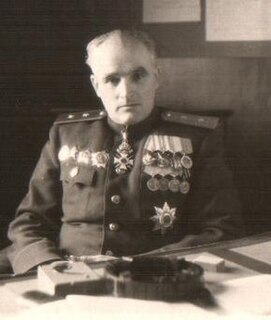
Alexander Grigoryevich Kapitokhin was a Red Army Lieutenant general. Kapitokhin commanded a sector in the final defence of Sevastopol and was later the commander of the Soviet Airborne Troops (VDV). He was awarded the Order of Lenin and three Orders of the Red Banner.
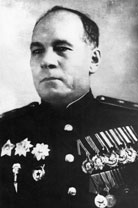
Alexander Fyodorovich Kazankin was a Red Army Lieutenant general who commanded the Soviet airborne. He fought in the Russian Civil War and graduated from the Frunze Military Academy in 1934. Kazankin led the 4th Airborne Corps during the Vyazma airborne operation. He later commanded the 1st Guards Airborne Division, 16th Guards Airborne Division, 12th Guards Rifle Corps and 39th Guards Rifle Corps. Kazankin became the Soviet airborne commander in October 1947, but was demoted to deputy commander in December 1948. After briefly becoming airborne forces commander again between January and March 1950, Kazankin successively became inspector general of the airborne forces and then deputy airborne forces inspector general before his death on 20 March 1955.

Nikolai Vasilyevich Kalinin was a Red Army Colonel general. He commanded the Soviet airborne from August 1987 to January 1989, after which Kalinin became the commander of the Moscow Military District. In August 1991, he supported the coup d'état attempt and was relieved of command after the coup failed. After retiring in 1993, Kalinin died on 7 March 2008.

Andrey Nikolaevich Serdyukov is a Russian Armed Forces colonel general and commander of the Russian Airborne Troops.

Boris Alexandrovich Vladimirov was a Soviet Army lieutenant general and a Hero of the Soviet Union. Vladimirov served in the Russian Civil War after being drafted into the Red Army in 1921. He became an officer and by 1941 was a deputy regimental commander. After the German invasion of the Soviet Union, Vladimirov successively became senior officer in charge of the formation of march battalions in the Siberian Military District, chief of staff of a ski brigade, and a rifle brigade. He commanded the rifle brigade in the Siege of Leningrad, during the Lyuban Offensive Operation and the Sinyavino Offensive. Vladimirov took command of the 311th Rifle Division in March 1943, leading it until the end of the war. He was awarded the title Hero of the Soviet Union for his leadership in the Vistula–Oder Offensive. Postwar, Vladimirov became a lieutenant general, commanded a rifle corps, and was deputy chief of staff of the Soviet airborne. He retired in 1960 and lived in Moscow.
Pyotr Georgievich Lushev was an Army General of the Soviet Army during the Cold War who was the last commander of the Supreme Commander of the Unified Armed Forces of the Warsaw Treaty Organization. Lushev was made a Hero of the Soviet Union on his birthday in 1983.



